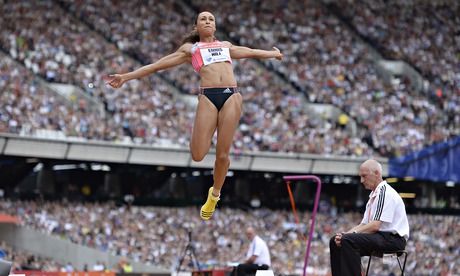
The finding by Sport England that fewer adults in England are doing even half an hour’s moderate sporting exercise a week, with a particular drop among the poor, has dealt another blow to the grand claims made for the 2012 London Olympics.
Tony Blair famously added the vote of the International Olympic Committee to other global triumphs when he promised a Games that would “see millions more young people in Britain and across the world participating in sport and improving their lives”. The organisers made “fostering a healthy and active nation” one of their promises as they set about spending the £9bn it cost to host 26 days of elite competition in that glorious and now half-remembered summer.
Blair’s ministers strained to make the pledge work. The Tory-Lib Dem government might wisely have disowned the notion that watching Mo Farah, Jessica Ennis-Hill and our rowers would inspire people to exercise more in real life. Yet the coalition adopted it.
Everyone who understands the impact of spectator sport knew it was never going to happen. Even a decade ago the evidence showed that people did not magically spring off their sofas after watching hours of the Manchester Commonwealth Games – and some are actually deterred from making their own modest efforts, feeling undermined by the spectacle of athletic perfection. The research had all been done – and assessed by Blair’s own office, in a paper called Game Plan.
The way to really get people exercising, as professionals well know, is hard work, straining against modern life’s inducements to be sedentary. We know too that everywhere in the west, poorer people participate in less sport than the wealthy. The coalition has reduced funding for school sport, taken billions off local authorities and left many people poorer – as a consequence 470,000 fewer poorer people are doing sport than a year ago, according to the Sport England figures. The total number of people taking part once a week has fallen to 36% of the 2012 figure.
Britain bid for the Olympics to buy a feelgood summer, and so politicians could bask in the afterglow. But persuading people to do more exercise requires commitment and stamina. There’s no sign that our rulers have either.
The Brady train
The real Olympic legacy winners, of course, are West Ham United, owned by David Sullivan and David Gold, who made their first fortunes in pornography. Next year the Premier League club will take charge of the Olympic stadium, built with £429m of public money, and for which the public is paying a further £160m to convert for West Ham. The club will pay rent, and stands to make a fortune from the 54,000-seat capacity – far more than than its current Upton Park home – and enhanced corporate feasting. Karren Brady, who has worked loyally for Sullivan all her career, negotiated this stadium deal of the century with London’s mayor, Boris Johnson, and has since been made a Conservative peer – Baroness Brady of Knightsbridge.
Going for gold
After the 2002 Commonwealth Games in Manchester, the stadium – built and converted with £127m public and lottery money – was handed over to Premier League Manchester City. The club’s local owners failed to make the most of their great fortune, and sold it to Thaksin Shinawatra, the former prime minister of Thailand. He cashed in after a year, making £90m profit by selling to Sheikh Mansour of Abu Dhabi. West Ham will surely become very saleable, in its brand new iconic stadium, built for the Games that were going to inspire a generation. There’s a pattern there somewhere.

